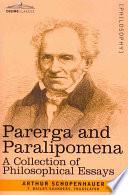Quotes from book
Parerga and Paralipomena

Parerga and Paralipomena is a collection of philosophical reflections by Arthur Schopenhauer published in 1851. The selection was compiled not as a summation of or introduction to Schopenhauer's philosophy, but as augmentary readings for those who had already embraced it, although the author maintained it would be comprehensible and of interest to the uninitiated nevertheless. The collection is divided into two volumes, covering first the parerga and thereafter the paralipomena to that philosophy. The parerga are six extended essays intended as supplementary to the author's thought. The paralipomena, short ruminations divided by topic into thirty-one subheadings, cover material hitherto unaddressed by the philosopher but deemed by him to be complementary to the parerga.

Ueberhaupt aber bin ich allmälig der Meinung geworden, daß der erwähnte Nutzen der Kathederphilosophie von dem Nachtheil überwogen werde, den die Philosophie als Profession der Philosophie als freier Wahrheitsforschung, oder die Philosophie im Auftrage der Regierung der Philosophie im Auftrage der Natur und der Menschheit bringt.
Sämtliche Werke, Bd. 5, p. 151, E. Payne, trans. (1974) Vol. 1, p. 139
Parerga and Paralipomena (1851), On Philosophy in the Universities

Man wolle nicht scheinen was man nicht ist. Das Vorgeben unbefangener Wahrheitsforschung, mit dem Entschluß, die Landesreligion zum Resultat, ja zum Maaßstabe und zur Kontrole derselben zu machen, ist unerträglich, und eine solche, an die Landesreligion, wie der Kettenhund an die Mauer, gebundene Philosophie ist nur das ärgerliche Zerrbild der höchsten und edelsten Bestrebung der Menschheit.
Sämtliche Werke, Bd. 5, pp. 155–156, E. Payne, trans. (1974) Vol. 1, p. 143
Parerga and Paralipomena (1851), On Philosophy in the Universities

“Obstinacy is the result of the will forcing itself into the place of the intellect.”
Vol. 2, Ch. 26, § 321
Parerga and Paralipomena (1851), Counsels and Maxims

Ja, bisweilen fühlt man sich versucht zu glauben, daß sie ihre ernstlich gemeinten philosophischen Forschungen schon vor ihrem zwölften Jahre abgethan und bereits damals ihre Ansicht vom Wesen der Welt, und was dem anhängt, auf immer festgestellt hätten; weil sie, nach allen philosophischen Diskussionen und halsbrechenden Abwegen, unter verwegenen Führern, doch immer wieder bei Dem anlangen, was uns in jenem Alter plausibel gemacht zu werden pflegt, und es sogar als Kriterium der Wahrheit zu nehmen scheinen. Alle die heterodoren philosophischen Lehren, mit welchen sie dazwischen, im Laufe ihres Lebens, sich haben beschäftigen müssen, scheinen ihnen nur dazu- seyn, um widerlegt zu werben und dadurch jene ersteren desto fester zu etabliren.
Sämtliche Werke, Bd. 5, p. 156, E. Payne, trans. (1974) Vol. 1, pp. 143-144
Parerga and Paralipomena (1851), On Philosophy in the Universities

Das Bedenkliche bei der Sache ist auch bloß die doch einzuräumende Möglichkeit, daß die letzte dem Menschen erreichbare Einsicht in die Natur der Dinge, in sein eigenes Wesen und das der Welt nicht gerade zusammenträfe mit den Lehren, welche theils dem ehemaligen Völkchen der Juden eröffnet worden, theils vor 1800 Jahren in Jerusalem aufgetreten sind.
Sämtliche Werke, Bd. 5, p. 154, E. Payne, trans. (1974) Vol. 1, p. 142
Parerga and Paralipomena (1851), On Philosophy in the Universities

Als auf die große Masse des Menschengeschlechts berechnet und derselben angemessen, kann bloß allegorische Wahrheit enthalten, welche sie jedoch als sensu proprio wahr geltend zu machen hat.
Sämtliche Werke, Bd. 5, p. 160, E. Payne, trans. (1974) Vol. 1, p. 147
Parerga and Paralipomena (1851), On Philosophy in the Universities

“There is no doubt that life is given us, not to be enjoyed, but to be overcome — to be got over.”
Allerdings ist das Leben nicht eigentlich da, um genossen, sondern um überstanden, abgethan zu werden...
Parerga and Paralipomena (1851), Counsels and Maxims

Andere wieder, von diesen Wahrheitsforschern, schmelzen Philosophie und Religion zu einem Kentauren zusammen, den sie Religionsphilosophie nennen; Pflegen auch zu lehren, Religion und Philosophie seien eigentlich das Selbe;—welcher Sah jedoch nur in dem Sinne wahr zu seyn scheint, in welchem Franz I., in Beziehung auf Karl V., sehr versöhnlich gesagt haben soll: „was mein Bruder Karl will, das will ich auch,”—nämlich Mailand, Wieder andere machen nicht so viele Umstände, sondern reden geradezu von einer Christlichen Philosophie;—welches ungefähr so herauskommt, wie wenn man von einer Christlichen Arithmetik reden wollte, die fünf gerade seyn ließe. Dergleichen von Glaubenslehren entnommene Epitheta sind zudem der Philosophie offenbar unanständig, da sie sich für den Versuch der Vernunft giebt, aus eigenen Mitteln und unabhängig von aller Auktorität das Problem des Daseyns zu lösen.
Sämtliche Werke, Bd. 5, p. 155, E. Payne, trans. (1974) Vol. 1, pp. 142-143
Parerga and Paralipomena (1851), On Philosophy in the Universities